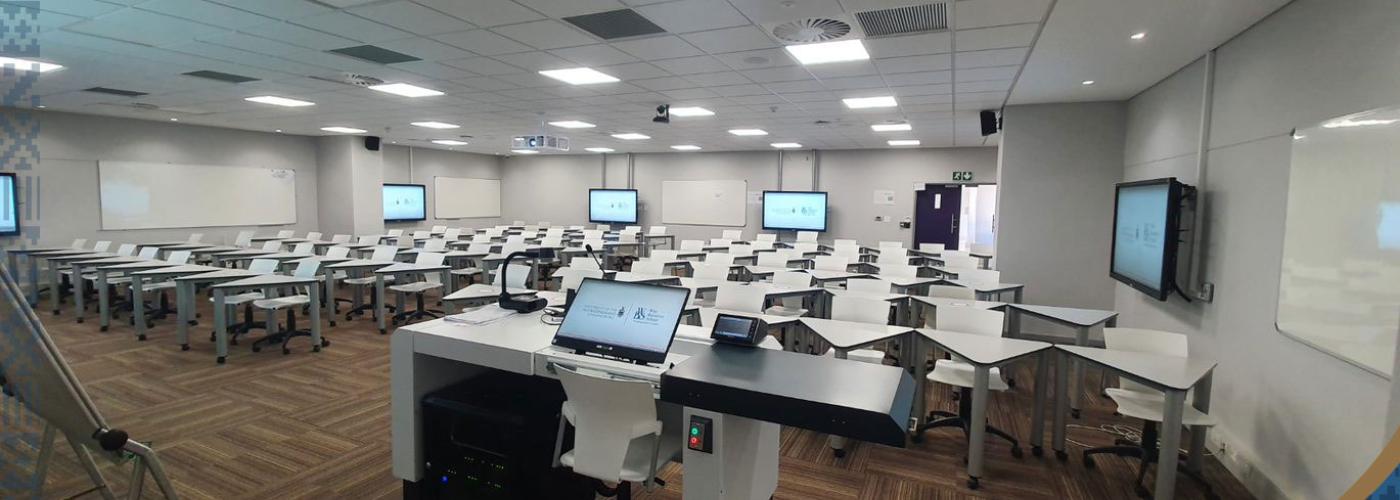
Setting New Standards: The Journey to Hybrid Learning at Wits Business School
Wits Business School has made significant inroads towards its goal of increased hybrid learning and teaching options. This is in line with Wits University’s blended learning strategy which aims to offer its students a tech-savvy, multidisciplinary, and flexible academic environment.
The hybrid journey forms part of WBS’s own strategic drive to enhance the student experience through operational efficiency. This includes a wholesale digitisation of the Parktown campus, as well as various infrastructural upgrades.
To date, a total of seven out of 12 classrooms at WBS have been converted to hybrid teaching venues, a project which took place in two phases during 2022 and 2023.
In order to successfully transition to a hybrid way of teaching, the dedicated WBS ICT team provided the necessary support and training for WBS academics - including weekends and after-hours. Teaching in a hybrid format is now “second nature” for most staff. That said, most lectures currently take place in person, the School’s preferred format.
“WBS still puts high value on the power of in-person learning as there is nothing to beat the experience of meeting fellow students on campus and engaging in syndicate groups face-to-face,” says Setumo Llale, Operations Director. “However, the hybrid classrooms give WBS a greater degree of flexibility for those students or faculty who are unable to come to campus for any reason. Hybrid functionality enables us to continue the teaching programme regardless. The pandemic has taught us the importance of being flexible and prepared for any situation.”
WBS’s hybrid classrooms were designed in line with three main principles:
- Ease of use - for both the lecturer and the students,
- Flexibility – being able to accommodate any device, workflow or video conferencing platform, and
- Maximum engagement – the online experience should enable everyone to be able to see all speakers and all content, and be able to ask questions or share content
The hybrid solution at WBS includes a number of state-of-the-art technologies. Each classroom boasts the highest quality in-room hardware for presentations including a laser projector, augmentation screens for comfortable viewing and a “confidence monitor” for the lecturer’s convenience; high-quality speakers for presentation and voice-enhancement audio, and full room automation based on pre-sets and user selections. In addition, the Ideahub interactive LED provides full engagement online as well as the ability to save notes, annotate and interact with content.
For those online, the system provides the ability to connect via any preferred on-line video conferencing platform with full engagement with the room speakers, microphone, camera and Ideahub. Two Pan-Tilt-Zoom cameras allow students to engage the entire venue with the ability to switch off the audience camera if preferred. The ceiling tile microphone’s AI provides automatic equalisation and echo cancellation, as well as the ability to detect the speaker’s location. Cameras are automatically switched to the speaker (camera tracking) to ensure on-line participants are engaged and involved in the session.
Additional features include in-room recording directly onto a USB storage device; an induction loop for hard-of-hearing students, and an in-room sensor for automatic sleep mode and power savings.
“Load shedding continues to be a real challenge,” comments Kreneshan Gopal, ICT Services Delivery Manager at WBS. “A power outage can sometimes mean five-to-ten minutes wait while the system reboots. Our next project is to instal UPSs in each venue so that our basic ICT equipment can continue uninterrupted, such as the projector and internet access.”
The final part of the WBS hybrid journey will see the upgrading of the iconic Donald Gordon Auditorium which is the site of many public events and conferences hosted by both WBS and the Wits School of Governance (WSG). This will enable WBS to host future events, such as its WBS Leadership Dialogues, conferences and seminars, in a hybrid format – providing a top-class venue for those attending in person and the ability to include an audience from further afield.
“Hybridisation supports the school’s broader strategy, of ensuring our impact in Africa and partnering with leading academic and business organisations on the continent and the rest of the world,” says Llale.

